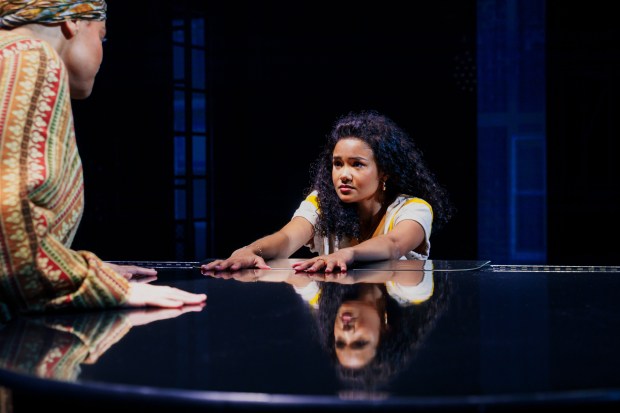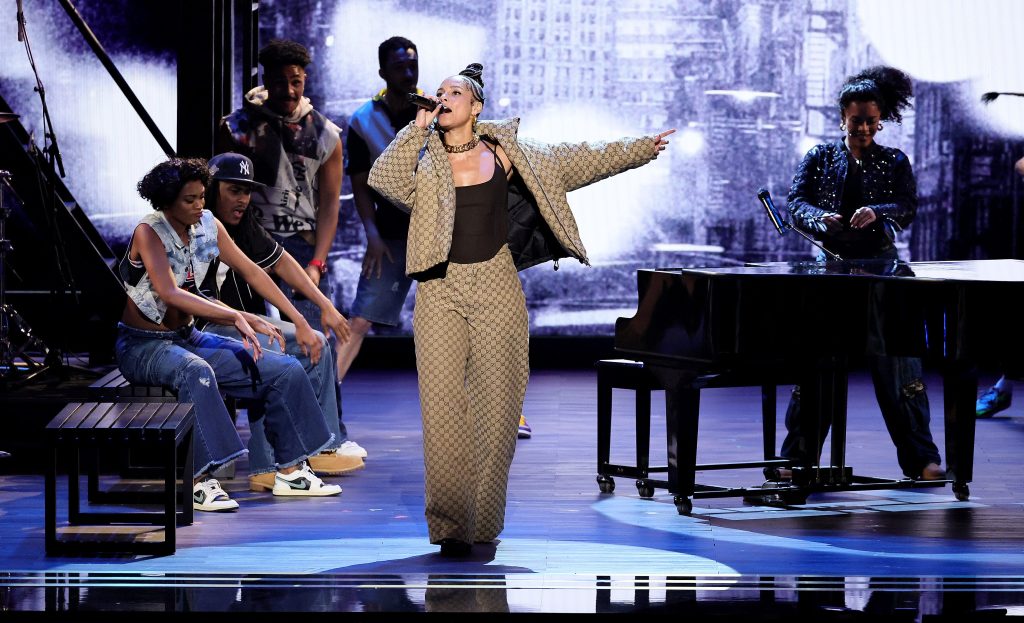The hit Broadway musical “Hell’s Kitchen” features the music of the singer-songwriter-pianist Alicia Keys (“Fallin’,” Girl on Fire”) and has a semi-autobiographical story that was inspired by her early life growing up in New York City. It debuted on Broadway last year and continues to run in New York, and a first North American tour will bring it to Chicago’s Nederlander Theatre this week.
Keys, the winner of 18 Grammy Awards, spoke by phone from Los Angeles. Our conversation has been edited for clarity and length.
Q: How did you want your music to be used in “Hell’s Kitchen? Big stars like yourself have different approaches to their music being on Broadway. Did you want the arrangements of your music to be familiar from the recordings?
A: I love this show, obviously. But one of the things I love the most is the way the music is used. … I wanted to surprise people. I wanted the music to take the story and propel it forward … I wanted the songs to be totally unexpected and to be used in ways people had never heard before. Then there are new songs that I wrote specifically for the show. “I’ve never heard the music this way before.” That was what we were looking for.
Q: The show has fictional elements but also lots in common with your actual life. Why did you make that choice? Did you not want a straight biography like the Tina Turner or Donna Summer shows? Did you not want a completely fictional story?
A: Firstly, I’m very clear that the show is inspired by my experiences growing up in New York City. I think that is the best way to ground it. Everything from there truly is a new story, written, created and crafted around the 17th year of this young girl named Ali, and the community around her. I remember clearly the moment when we wondered, “Should she get older?” No. No. The point is not that. The point is, all the things that happen to her in this year that set her up to discover who she is. The power within her.
That’s why it becomes a story of family, community, and a young woman who is really finding her way, which ultimately represents all of us trying to find our way at any point in our lives. It didn’t matter what would happen to her over the next 10 years. Because it was not autobiographical anyway, it would not have made sense to go further. It is really about trying to extract the truth of a person and these people around us who cultivate who we become. … Every single one of us has had an impactful mentor. That, and the mother-daughter love story at its heart, is why people feel so connected to the show.
Q: What was your process with Kristoffer Diaz (an ensemble member at Chicago’s American Blues Theater), who wrote the book?
A: It was electric from the beginning. I knew we were writing a New York story, so it was important to have someone who had experienced a New York story. I met a few writers from here, there and down over there and to the west over here. But when I met Kris, we could have this free experience talking about what streets we walked down and things like that. So we had this connection from the beginning. What it felt like being a teenager in New York. We just talked about real life together. That was the beginning of how the pieces came together. But we were newbies. So we added Michael Greif, a veteran director. He sent us on our way.
Q: Serena Williams is now a producer on the tour?
A: She is in love with the show! We sat in empty seats after the show, just talking. She said she hadn’t felt that way before in the theater. She spent time with the cast, explained the mentors who had changed her life. So she was excited to be part of helping our show travel the whole country.
 Roz White as Miss Liza Jane and Maya Drake as Ali in the North American tour of the musical “Hell’s Kitchen.” (Marc J. Franklin)
Roz White as Miss Liza Jane and Maya Drake as Ali in the North American tour of the musical “Hell’s Kitchen.” (Marc J. Franklin)
Q: You are a product of subsidized artists’ housing and also a public, performing arts high-school. We are having an issue with such a school in Chicago at present. What did those formative experiences mean to you? Did it help?
A: So Ali lives in this artist’s building called Manhattan Plaza. That part is true, as it was where I grew up. The rent was subsidized and it would fluctuate based on what you made. You might have been a drummer, an actor, a violinist. Not the most stable jobs. Some weeks, you might not be working. But it gave people, and me, access to the middle of Manhattan: the museums, the beautiful theater district, the shows. That is how I grew up. I could see the possibilities. I went to a small arts school but it was special and I could study music. I literally walked there every day. That was the place where I met one of my most important mentors, Miss Aziza, the inspiration, along with my grandmother, for the music teacher in the show, Miss Liza Jane. Miss Aziza was the living example of what I did not even know what it was possible to become.
That school gave me that experience. And when we put “Hell’s Kitchen” up at the New York Public Theater and again on Broadway, Miss Aziza played the piano — Miss Liza Jane’s piano part.
Q: Now you have a new cast.
A: Maya Drake, who is literally the 18-year-old young woman who plays Ali, is unbelievable. I have a lot of family in Chicago who are coming out.
Q: Are you coming out?
A: I might have to pop up.
“Hell’s Kitchen” opens Wednesday and runs through Nov. 30 at the James M. Nederlander Theatre, 24 W. Randolph St.; tickets from $65.60 at www.broadwayinchicago.com
Chris Jones is a Tribune critic.
cjones5@chicagotribune.com
